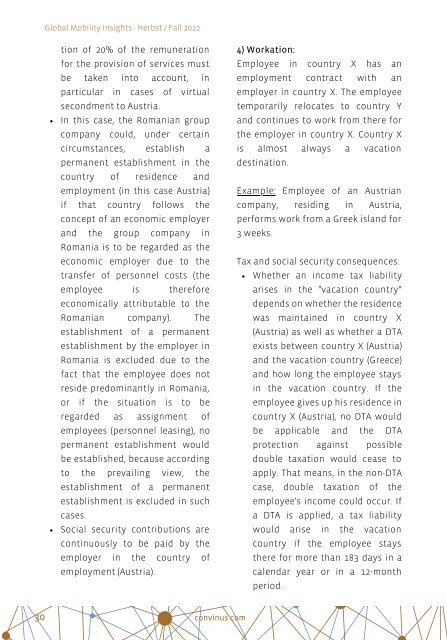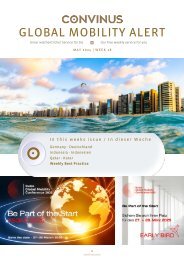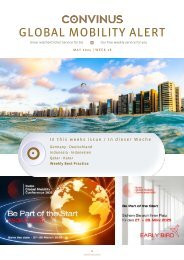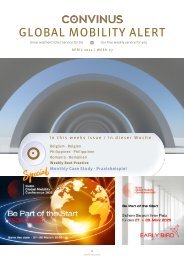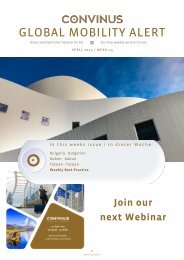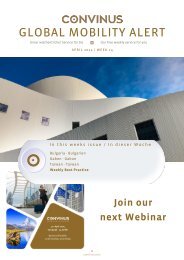CONVINUS Global Mobility Insights NEWSLETTER Herbst / Fall 2022
«Familiar expertise in a new look - the next generation of our popular CONVINUS newsletter is here! » To take the next steps, we have repackaged our popular newsletter and given it a modern layout. We cannot master the challenges in the Global Mobility sector alone, so we offer our great CONVINUS Global Network partners a special platform here. In each of our newsletters we will introduce you to some of them. The issues that concern you also concern us. For this reason, we are pleased to present the autumn issue 2022, with the following focus: «Remote Work / Digital Nomad / Home Office» • CONVINUS for the perspective from Switzerland • Globalization Partners for a global overview • Artus for the perspective from Austria • Corporate Relocations Greece for the perspective from Greece
«Familiar expertise in a new look - the next generation of our popular CONVINUS newsletter is here! »
To take the next steps, we have repackaged our popular newsletter and given it a modern layout. We cannot master the challenges in the Global Mobility sector alone, so we offer our great CONVINUS Global Network partners a special platform here. In each of our newsletters we will introduce you to some of them.
The issues that concern you also concern us. For this reason, we are pleased to present the autumn issue 2022, with the following focus: «Remote Work / Digital Nomad / Home Office»
• CONVINUS for the perspective from Switzerland
• Globalization Partners for a global overview
• Artus for the perspective from Austria
• Corporate Relocations Greece for the perspective from Greece
You also want an ePaper? Increase the reach of your titles
YUMPU automatically turns print PDFs into web optimized ePapers that Google loves.
<strong>Global</strong> <strong>Mobility</strong> <strong>Insights</strong> - <strong>Herbst</strong> / <strong>Fall</strong> <strong>2022</strong><br />
tion of 20% of the remuneration<br />
for the provision of services must<br />
be taken into account, in<br />
particular in cases of virtual<br />
secondment to Austria.<br />
In this case, the Romanian group<br />
company could, under certain<br />
circumstances, establish a<br />
permanent establishment in the<br />
country of residence and<br />
employment (in this case Austria)<br />
if that country follows the<br />
concept of an economic employer<br />
and the group company in<br />
Romania is to be regarded as the<br />
economic employer due to the<br />
transfer of personnel costs (the<br />
employee is therefore<br />
economically attributable to the<br />
Romanian company). The<br />
establishment of a permanent<br />
establishment by the employer in<br />
Romania is excluded due to the<br />
fact that the employee does not<br />
reside predominantly in Romania,<br />
or if the situation is to be<br />
regarded as assignment of<br />
employees (personnel leasing), no<br />
permanent establishment would<br />
be established, because according<br />
to the prevailing view, the<br />
establishment of a permanent<br />
establishment is excluded in such<br />
cases.<br />
Social security contributions are<br />
continuously to be paid by the<br />
employer in the country of<br />
employment (Austria).<br />
4) Workation:<br />
Employee in country X has an<br />
employment contract with an<br />
employer in country X. The employee<br />
temporarily relocates to country Y<br />
and continues to work from there for<br />
the employer in country X. Country X<br />
is almost always a vacation<br />
destination.<br />
Example: Employee of an Austrian<br />
company, residing in Austria,<br />
performs work from a Greek island for<br />
3 weeks.<br />
Tax and social security consequences:<br />
Whether an income tax liability<br />
arises in the "vacation country"<br />
depends on whether the residence<br />
was maintained in country X<br />
(Austria) as well as whether a DTA<br />
exists between country X (Austria)<br />
and the vacation country (Greece)<br />
and how long the employee stays<br />
in the vacation country. If the<br />
employee gives up his residence in<br />
country X (Austria), no DTA would<br />
be applicable and the DTA<br />
protection against possible<br />
double taxation would cease to<br />
apply. That means, in the non-DTA<br />
case, double taxation of the<br />
employee's income could occur. If<br />
a DTA is applied, a tax liability<br />
would arise in the vacation<br />
country if the employee stays<br />
there for more than 183 days in a<br />
calendar year or in a 12-month<br />
period.<br />
30 convinus.com


